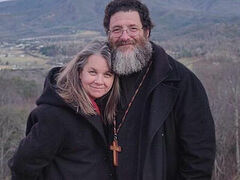God is love (1 Jn. 4:8), the holy Apostle John the Theologian says. God is the unity of three Persons. Love can manifest itself and develop only in community, in the unity of personalities. God created man in His own image so that man could become like Him. The image of God in man is realized in his ability to perceive and develop love on his level. When someone lives in communion with God and in love with his neighbors, then he attains perfection or likeness to God. The family is a place where God's love should dwell. The family is an icon of the Holy Trinity.
The Biblical words, It is not good that the man should be alone; I will make him an help meet for him (Gen. 2:18), emphasize a fundamental truth for man who cannot realize himself alone, but only in connection with his neighbors. In a family a man realizes himself through a woman, and a woman realizes herself through a man. Children complete the union of two parents. In society, no one can realize himself on his own, but only in community with others and with their help. Otherwise, the original purpose of creating man (who was not created to exist alone) is distorted. Hence all human suffering.
And God blessed them, and God said unto them, Be fruitful, and multiply, and replenish the earth, and subdue it (Gen. 1:28). It was the first commandment of God to people. Children are a result of love uniting a man and a woman, making them both one flesh: Therefore shall a man leave his father and his mother, and shall cleave unto his wife: and they shall be one flesh (Gen. 2:24). Love is not limited to only two people, but makes them participants in God’s creative work through them, namely through childbirth. We see from these Biblical quotations that the original idea of the family is mutual help and childbirth so that the human race can continue.
In the time of the Old Testament the family was viewed as a sacred institution, protected by the commandments given by God through Moses. Over time, monogamy and the indissolubility of the family became the norm of social coexistence. If we open the Old Testament, we will see that it severely punishes adultery, homosexuality and abortion, along with other sins that weaken or destroy the family.
What is the sacrament of marriage?
The Biblical readings in the Orthodox sacrament of marriage are taken from the Apostle Paul’s Epistle to the Ephesians. In the spirit of the prophets of the Old Testament (the Prophet Hosea, etc.), when they spoke about the “marital” relationship between God and the people of Israel, the Apostle Paul bases the union of a man and a woman on that of Christ and the Church. Just as Christ loved the Church and gave His life for it, so husbands must love their wives. Thus, marriage should symbolize the relationship between Christ and the Church. In Cana of Galilee the Lord performed His first miracle, turning water into wine, which symbolized the transition of mankind from the Old Testament to the New and the transformation of marriage into a mystery that elevates two uniting people to a reality beyond their nature: That the righteousness of the law might be fulfilled in us, who walk not after the flesh, but after the Spirit (Rom. 8:4); This is a great mystery: but I speak concerning Christ and the Church (Eph. 5:32).
Today, in our de-Christianized society, the sacrament of marriage is often reduced to the performance of a church rite. People often do not realize that the grace received through the prayers of the Church requires the spouses’ synergy with it throughout their lives. When performing the wedding, the priest prays that God will grant the spouses a peaceful and long life and mutual love in a peaceful union. He also prays that God will bless them, give them good children, unity of the souls and bodies, and crown them with love. At their wedding the bride and groom promise that they will keep the bonds of love and union with each other in purity, faithfulness and honesty to the end and will not abandon their responsibilities. God keeps us in peace and mutual understanding only to the extent that we ourselves strive for peace and mutual understanding. The sacrament of marriage cannot be completely fulfilled, and the marriage bed cannot remain undefiled unless the spouses make efforts to live according to the will of God through prayer and self-restriction.
Children are a gift from God, but we must develop this gift; we must make efforts to put them on their feet and give them a good upbringing. Child raising should begin when children are still developing in their mother’s womb, and then continue into their childhood years when the personality is being formed. It depends on us what we invest in our children.
In my opinion as a pastor, we Christians are making a great mistake today. We expect the grace received at Baptism, in the Eucharist, at the wedding and through other prayers of the Church to act and bear fruit in our lives automatically, without our own prayerful participation, without ascetic efforts and the desire to live according to the commandments of Christ on our part. We forget that we can be true, full-fledged Christians only to the extent that we allow the grace of Baptism to work in us, according to the promises we made during this sacrament. During Baptism we promised that we would renounce satan and all his works and unite with the humble and obedient Christ. In this sense, we cannot build a Christian family just by participating in a wedding ceremony. But we become one whole family through mutual love when we live according to the will of God and fulfill His commandments.
The grace of God does not work without our co-operation: For we are labourers together with God: ye are God's husbandry, ye are God's building (1 Cor. 3:9). God respects the freedom He gave man at the time of Creation. The grace of God is very fragile and delicate, and it is present and acts in us in a special way. But grace leaves us if we are careless and indifferent to it. And it returns only when we begin to call upon it again with our prayers, humbling ourselves for love, humility and patience.
Undoubtedly, one of the greatest problems the Christendom is facing today is the extremely low birth rate, which threatens the existence of Christians themselves. Family planning and birth control for the purpose of having few or even no children goes against human nature. This is sure to have negative consequences for the physical and mental health of people, as well as for the entire society, which is increasingly aging and is at risk of dying out.
The Orthodox Church does not consider problems related to family life in a legal form or through encyclicals, as is the case in the Catholic Church, but primarily as spiritual issues. A priest can examine and resolve in detail every controversial situation in a family. In an Orthodox family the spouses together with their father-confessor and with the help of the Holy Spirit make important decisions regarding the couple's family life (of course, provided that the spouses seek advice from a priest).
Nevertheless, with an aching heart we have to state that the number of abortions in traditionally Orthodox countries is much higher than in other countries, and birth rates are low. Today, civil law in almost every country no longer protects traditional family values. That is why today we are witnesses to an unprecedented widespread decline in the institution of the family. It causes a great deal of suffering in people’s souls, because the multiplication of sins entails a multiplication of suffering.
Divorce
Divorce is the greatest tragedy that a family can experience. The Orthodox Church stands strongly for the indissolubility of marriage, since marriage is a sacrament: Wherefore they are no more twain, but one flesh. What therefore God hath joined together, let not man put asunder (Mt. 19:6). The Savior also says: But I say unto you, That whosoever shall put away his wife, saving for the cause of fornication, causeth her to commit adultery: and whosoever shall marry her that is divorced committeth adultery (Mt. 5: 32).
Nevertheless, the Orthodox Church allows believers to enter into a second marriage, which it does not consider as a sacrament, but as a blessing for two remarrying people. Those who have entered into such a marriage are given another chance to remain in the community of the faithful through repentance. The service blessing the second marriage has a deep penitential character. The Church recognizes a divorce declared by the civil authorities. A bishop is supposed to give his blessing to those marrying for the second time on the basis of their repentance. However, it does not mean a repetition of the sacrament of church wedding. This attitude of the Orthodox Church towards remarriage takes into account human weakness and responds to the desire of believers to continue to participate in the life of the Church fully, especially in the Eucharist.
Holy Communion in the Eucharist
The participation of the faithful in the Liturgy and Communion of the Holy Body and Blood of Christ means their full inclusion in Church life. The Church is identified with the Eucharist, and the Eucharist with the Church in the sense that both are the Body of Christ. The assembly of the faithful as a visible and earthly Church celebrates the Eucharist, and the Eucharist transforms believers into the Church as the Body of Christ through their Communion of the Holy Gifts. Even as Christ is the head of the Church: and He is the Saviour of the body (Eph. 5:23). Thus, the faithful become the Church of Christ, living members of this body: Now ye are the body of Christ, and members in particular (1 Cor. 12:27).
If Christians want to participate in the Eucharist they must be full-fledged members of the Church--that is, if they live in a state of grace received by them in Baptism. But if a Christian falls into grave or mortal sins, such as murder (including abortion), hatred, adultery, unfair treatment of his neighbors or their oppression, then he loses a state of grace and is enslaved by evil. His return to a state of grace occurs through repentance, through deep regret for the sins committed and their confession with the determination not to repeat them again. Such repentance should be accompanied by fasting, prayers and the fulfillment of God's commandments. Repentance is a virtue that should accompany Christians throughout their lives.
Children in Orthodox families should receive Communion on an equal basis with adults. Participation of all family members in the Liturgy is a great help for everyone in the family to grow in love so that they can all live in concord.
Unfortunately, we often see that only children receive Communion at the Liturgy regularly. It may result in them breaking with the Church and stopping taking Communion in their youth, following the example of their parents. Therefore, parents should be a model for their children in everything. Amen.







